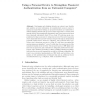Free Online Productivity Tools
i2Speak
i2Symbol
i2OCR
iTex2Img
iWeb2Print
iWeb2Shot
i2Type
iPdf2Split
iPdf2Merge
i2Bopomofo
i2Arabic
i2Style
i2Image
i2PDF
iLatex2Rtf
Sci2ools
121
click to vote
FC
2007
Springer
2007
Springer
Using a Personal Device to Strengthen Password Authentication from an Untrusted Computer
Keylogging and phishing attacks can extract user identity and sensitive account information for unauthorized access to users’ financial accounts. Most existing or proposed solutions are vulnerable to session hijacking attacks. We propose a simple approach to counter these attacks, which cryptographically separates a user’s long-term secret input from (typically untrusted) client PCs; a client PC performs most computations but has access only to temporary secrets. The user’s long-term secret (typically short and low-entropy) is input through an independent personal trusted device such as a cellphone. The personal device provides a user’s long-term secrets to a client PC only after encrypting the secrets using a pre-installed, “correct” public key of a remote service (the intended recipient of the secrets). The proposed protocol (MP-Auth) realizes such an approach, and is intended to safeguard passwords from keyloggers, other malware (including rootkits), phishing attacks an...
Related Content
| Added | 07 Jun 2010 |
| Updated | 07 Jun 2010 |
| Type | Conference |
| Year | 2007 |
| Where | FC |
| Authors | Mohammad Mannan, Paul C. van Oorschot |
Comments (0)

